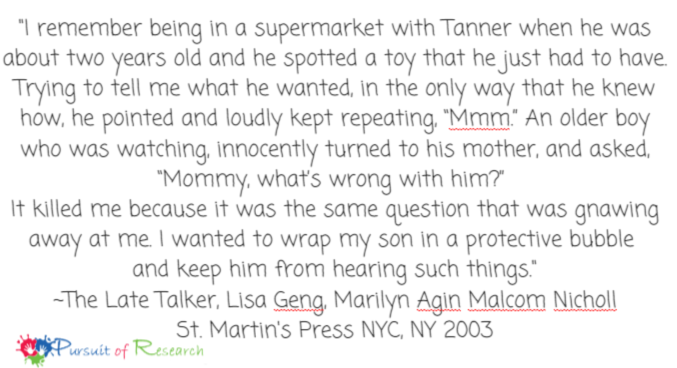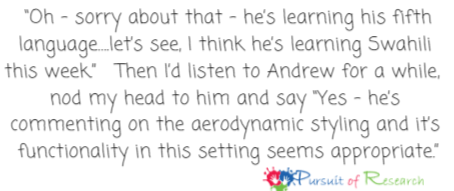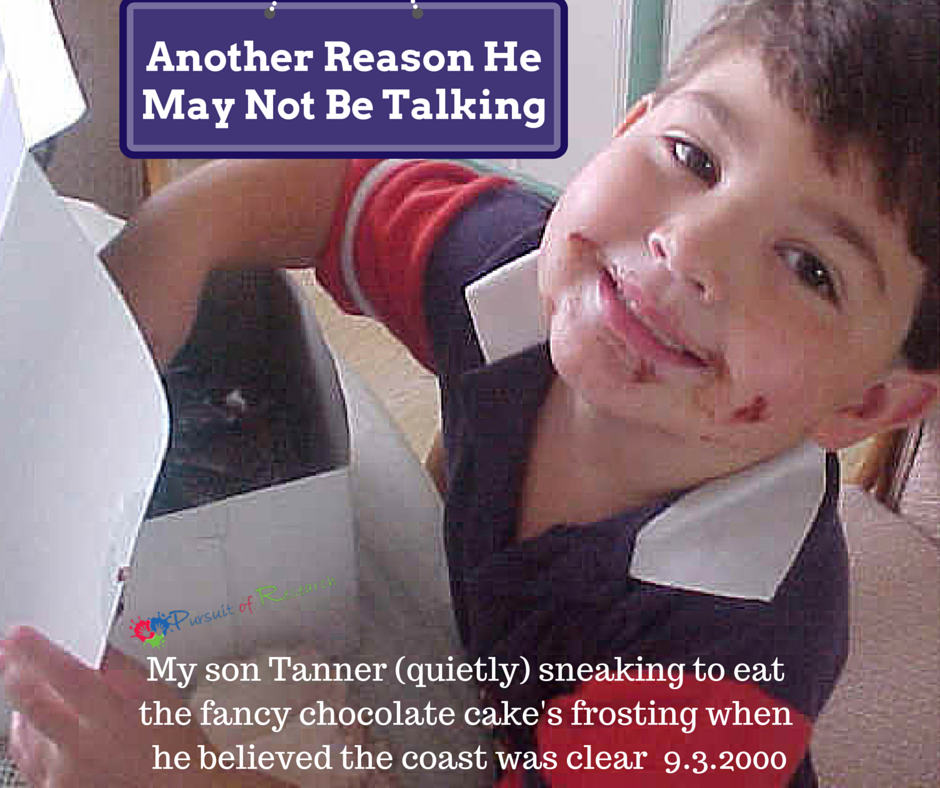“Does he ever talk? Why isn’t he saying hello? Is there something wrong with him?”
 Always be prepared for it if you have a child with a communication impairment. You start to get a sense of when that question is coming from a well meaning (or rude) stranger. Sometimes it’s when someone hears how your child communicates, or there will be a few other questions first like, “Is he deaf?” or maybe you aren’t prepared when a stranger asks your child “how old are you?” and then asks when your child doesn’t respond before you have a chance to say anything.
Always be prepared for it if you have a child with a communication impairment. You start to get a sense of when that question is coming from a well meaning (or rude) stranger. Sometimes it’s when someone hears how your child communicates, or there will be a few other questions first like, “Is he deaf?” or maybe you aren’t prepared when a stranger asks your child “how old are you?” and then asks when your child doesn’t respond before you have a chance to say anything.
“What’s wrong with him?”
Most of us have kids with communication impairment that look just like any other child even if they have a boatload of diagnosis. Apraxia, autism, hypotonia, sensory processing disorder and motor planning impairments don’t always stand out if you don’t know what to look for, and if the child isn’t having a sensory meltdown.
If you haven’t been asked the “What’s wrong with him?” question yet, your child is probably younger than 3 and you are probably instead still dealing with the “Just give him time” and being educated about Einstein not talking till he was five (he started talking between 2 and 3 years old BTW).
It goes very quickly from “He’s just a late talker” to the “what’s wrong with him?” when you have a child with a communication impairment and it’s good to be prepared.
Like me, the first time you hear it it’s probably going to hit you hard, because it’s a question you probably never asked yourself before, and hearing someone else say it out loud feels like a punch to the gut. They aren’t just asking a question they are literally asking you what is wrong with your child, your precious child.
After the first few times the question may not bother you as much, but you now have to worry about your child hearing that question over and over. In addition to the frustration our children deal with on not being able to communicate, we have to protect our children’s self esteem from people asking questions like “what’s wrong with him?” right in front of them when they can perfectly understand what that question means.
If you haven’t yet had a conversation with your child about his impairment and don’t want or feel the need to discuss it with a curious stranger, instead of replaying, “He can’t talk” I have a number of suggestions, but will start with a basic tip.
Answering or avoiding the “What’s wrong with him?” question
When you get the question, or to avoid it from someone that is prying, looking directly at the person just smile and say “He’s learning to talk and he’s doing great!” That’s your simple go to response which will work for probably around 95 percent of strangers.
If they still keep asking you questions and you don’t want to answer, ignore them and bend down to be on eye level with your child and say to him, “Aren’t you doing great you sweet little thing?!”
You’ve now provided the stranger with both verbal and physical cues that you don’t want to discuss this in front of your child, and that your child understands.
I learned the hard way however that not everyone is perceptive to blatant verbal and physical cues. So for these people I have another method to take it one step further that I believe in foolproof (literally -pardon the pun)
I was in a store and the cashier just wouldn’t drop it no matter how strong my verbal and physical cues were. And there was a line in back of me too. Why she insisted on continuing to pry I have no idea. She ignored my comments and just kept asking questions, “Hello. Hello. Hello? Can you say hello? Can you talk at all?” She then turns to me and asks, “Does he ever talk? Why isn’t he saying hello? Is there something wrong with him?”
And there it was…. the dreaded question in spite of me letting her know already that he’s learning to talk and it was all so quick. In that situation there was no way to run away either as I didn’t yet pay for the groceries.
Quickly I got an idea, I bent down and used simple sign language to ask Tanner if he was thirsty. “Tanner, are you thirsty” Then I used simple sign language for eat. “Tanner, are you hungry?”
Even though I couldn’t see her I heard her say “oh” Clearly the sign language worked, she thought my son was deaf and shut up.
I was only caught off guard for once -and you never have to be! Just learn the simple signs for drink and eat! For drink: Just make your hand look like a cup and tilt it toward your mouth. For eat: take all your fingers and push them together and “woodpecker” your fingers toward your mouth. Below are videos for simple signs for eat and drink, and there are more reasons to introduce “baby sign” if you haven’t already on this page.
Baby Sign Language For Drink
Baby Sign Language For Eat
A funny response to “What’s wrong with him?”
by Terri White shared with permission through the Cherab Foundation.
“When Andrew was a toddler – he had no understandable speech. When he saw something that struck his fancy (like ceiling fans) he would tense his entire body, staring at it, and yell something… He enjoyed watching stuff like that, and since he was also a very large 3-year-old – people couldn’t figure it out.
So – when someone asked that question “What’s wrong with him?,” I usually said something like “Oh – sorry about that – he’s learning his fifth language….let’s see, I think he’s learning Swahili this week.” Then I’d listen to Andrew for a while, nod my head to him and say “Yes – he’s commenting on the aerodynamic styling and it’s functionality in this setting seems appropriate.”
It made it easier for me to deal with…..
It was harder when someone said, “Why doesn’t he talk?” (Boy, how I wish I knew the answer to that one!) ~Terri White
Another reason your child may not be talking
My son Tanner when he was 4 years old.



Oh, the Einstein comment! I do not believe they are still using that! I have that written in my “The Beginning” story (that I may not ever finish writing) – that was a big one way back when. Generally I don’t mind people asking questions. I would rather they ask instead of staring or whispering – that being said, there are so many better ways to ask than “What’s wrong with him?” or “Is there something wrong with him” – just plain rude.